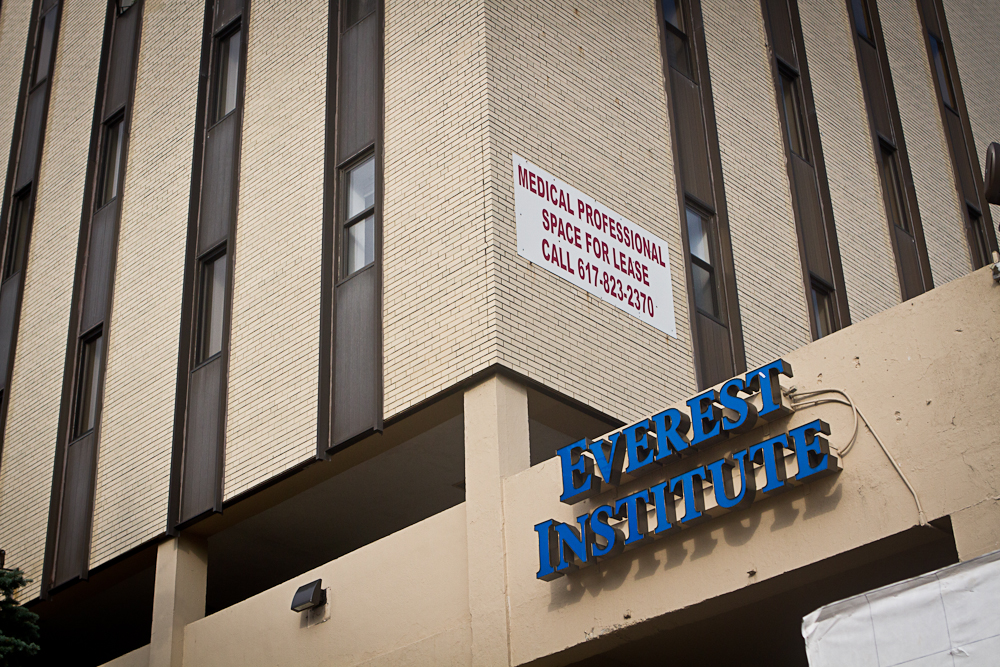
The Everest Institute in Boston is one of 97 Corinthian-owned campuses across the country that shut down in 2014. The Accrediting Council of Independent Colleges and Schools authorized several Corinthian-owned campuses and its standards are now coming under scrutiny. (Mallory Noe-Payne/WGBH)
The U.S Department of Education on Wednesday took a step toward shutting down the Accrediting Council for Independent Colleges and Schools, recommending it not be renewed as an accrediting body later this summer.
Although it may be something we can take for granted, college accreditation is one of the most fundamental processes in higher education; it determines which schools get billions of federal aid dollars and which schools do not.
Some of the people who make those calls work at the Accrediting Council of Independent Colleges and Schools. Founded in 1912 and located in the heart of Washington, D.C., ACICS is the country’s largest national college accrediting agency.
Related: The Days May Be Numbered For Corinthian Colleges' Accreditor
The agency has about 40 employees who are tasked with accrediting hundreds of technical and career colleges, including ITT Tech, a career-focused institution that grants degrees in specific fields like nursing, computer science and accounting.
ACICS’ top executive Anthony Bieda says the agency subjects these schools to a 200-page survey.
"It requires everything, including mission purpose, administrative capacity of the organization," Bieda said, ticking of a long list of requirements. "It includes faculty qualifications, scope and sequence of the curriculum, instructional materials, facilities, student services, library resources."
Despite the long list of standards, the agency has recently come under fire for continuing to grant accreditation to campuses owned by the for-profit giant Corinthian Colleges. Corinthian had received $3.5 billion in federal aid - until two years ago, when it collapsed.
Related: Feds Announce Debt-Relief Program For Defrauded Corinthian Students
The U.S. Education Department had conducted its own independent review of Corinthian and found that the for-profit school used high-pressure sales tactics and lied on the surveys about things like enrollment and graduation rates. The Department then froze access to federal student aid dollars and Corinthian went bankrupt. After scores of Corinthian owned campuses were sold or shutdown, defrauded students have been seeking a pathway to debt relief.
But Bieda claims that there was no indication Corinthian was misleading students.
“We did not [find Corinthian was misleading students]. We were comfortable - maybe mistakenly so - but we were comfortable that most of the time, most of the data they were providing was accurate.” said Tony Bieda, ACICS’ Executive in Charge. “The Department had a different perspective."

Anthony Bieda has been ACICS’ Executive in Charge since his predecessor stepped down earlier this year. (Kirk Carapezza/WGBH)
Critics say the accreditation process is rigged, and that it’s designed to ensure that for-profit colleges get and maintain accreditation.
"It’s as if a bunch of bars all banded together and decided ‘we’re gonna pay to have a third party come in and approve us’” said Ben Miller, a fellow at the Center for American Progress, who researches federal higher education policy. “When that happens, they’re the ones ultimately hiring the approver and they’re the ones paying for it. So it’s not, by any means, truly independent."
In light of Corinthian’s collapse, Miller says American higher education is facing an accreditation crisis. He and many others are calling for more transparency.
"The biggest challenge with Corinthian is [the public doesn’t] know if the accreditation agencies were blind or naive,” Miller said. “We've never seen their actual documents, so we don't know what they did or didn't find. What we do know is that regardless of what they did or didn't see, they didn't do anything."
Miller says there's absolutely no financial incentive for agencies to deny schools accreditation.

(Courtesy of ACICS)
"If you start denying lots of people, that hurts your revenue and it makes it harder for you to stay in business," Miller said.
In light of Corinthian’s collapse, Miller says the government should strip the agency of its right to accredit schools.
Perhaps with some foresight, the agency stopped accepting new applications for colleges seeking to become accredited earlier this month. But Bieda defended the accreditation process and his agency's role in it.
"What is the alternative?'" Beida asked. "The alternative will be mid-level, government bureaucrats going into schools and saying, ‘We deem this one to be good, we deem this one to be mediocre, and we deem this one to be bad,’” Bieda said. “Is that a better outcome?"
In the case of Corinthian, Bieda says that the review could have been ‘more rigorous,’ or ‘more frequent.’
“But at the end of the day, it’s a matter of trust,” he said.
A matter of trust, with billions of federal dollars on the line.
Earlier: What Exactly Happens Inside Graduate School Admissions Rooms?
On Campus intern Shirley Wang contributed to this story.










